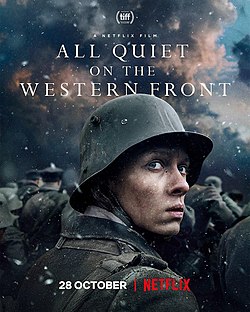From the first scene of Germany’s All Quiet On The Western Front, it’s made clear that there is no glamour or romance to war.
The year is 1917 and the Great War (or World War I as future historians will call it) has been underway for three years. On the Western Front, soldiers hide in trenches and wait for the inevitable order to try to advance to the next set of trenches. Most of the soldiers are cut down by machine gun fire and explosions as soon as they go over the top. Many more are killed as they try to run across the killing field. We are introduced to one soldier who has been ordered to charge. Within a few minutes, he is dead and his uniform has been taken, washed, and sewn up so that it can be given to whoever will be the next to enlist. The whole process plays out with a disturbing efficiency. That several men have just died in a attack that seems to lack any strategic purpose does not matter. What matters is that the uniform be ready to be worn by whoever follows.
The uniform is next handed to Paul (Felix Kammerer), a 17 year-old who not only enlists in the Imperial Germany Army but who plays a key role in convincing his friends to enlist as well. Paul has been moved by the patriotic speeches that he heard from his teachers. He expects war to be an adventure. Upon their arrival on the Western Front, Paul and his friends are surrounded by death. With their uniforms on and their gas masks over their faces, they are nearly unrecognizable as individuals. Instead, they look like what they are, cogs in the war machine. Paul spends his first night in the trenches while bombs explode all around him. His friend, Ludwig (Adrian Grunewald), cries that he wants to return home. By the next morning, Ludwig is one of the many who is now dead. Only Kat (Albrecht Schuch) is willing to look after Paul and his friends. Kat is considered to be a weathered veteran because he has managed to survive for nearly a year on the Western Front.
All Quiet On The Western Front is based on the classic anti-war novel by Erich Maria Remarque. (A previous adaptation won the Oscar for Best Picture in 1930 and is generally considered to be the first truly “good” Best Picture winner.) Th film takes some liberties with the book’s plot while still remaining faithful to Remarque’s theme of the futility of war. One change is that, along with following Paul’s day-to-day life on the Western Front, the film also details the efforts of diplomat Mattias Erzberger (Daniel Bruhl) to negotiate Germany’s surrender. It’s a fairly big departure from Remarque’s narrative but one that definitely stays true to the spirit of the book. Despite the fact that Germany knows that it has been defeated and that it will have to surrender, Paul and his friends are still expected to fight and sacrifice their lives for a victory that is no longer attainable. Indeed, the closer that Erzberger comes to signing a cease fire, the more determined General Friedrichs (Devid Striesow) becomes to launch one final, great offensive before the war ends. The soldier have no idea what is going on during Erzberger’s negotiations and Erzberger has no idea that Paul has lost the majority of his friends and has been forced to do things that will forever haunt him. They may not know about each other but Paul’s fate depends on Erzberger’s decisions and the legacy of Erzberger and all the other diplomats and commanders is to be found in what happens to soldiers like Paul.
All Quiet On The Western Front is a brutally effective anti-war film. Director Edward Berger puts the viewer right in the middle of combat and it is absolutely terrifying. Paul goes from being an enthusiastic patriot to a hollow-eyed cynic, one who knows that he is considered expendable by both the enemy and his commanders. The viewer, like Paul, quickly realizes that there is no way to win this war, other than to somehow survive long enough to return home. But even the soldiers who do survive understand that they won’t have much of a home to return to. (In a particularly shocking scene, one solder stabs himself in the neck with a fork rather than return home crippled.) While the the commanders negotiate in luxury, the soldiers live in mud and die almost randomly. The commanders may talk about strategy but the soldier know that survival comes down to luck.
It’s a harrowing film but it’s also exactly what an anti-war film should be. There’s a chance that this film could be the second adaptation of All Quiet On The Western Front to receive a nomination for Best Picture and it would certainly be deserved.
